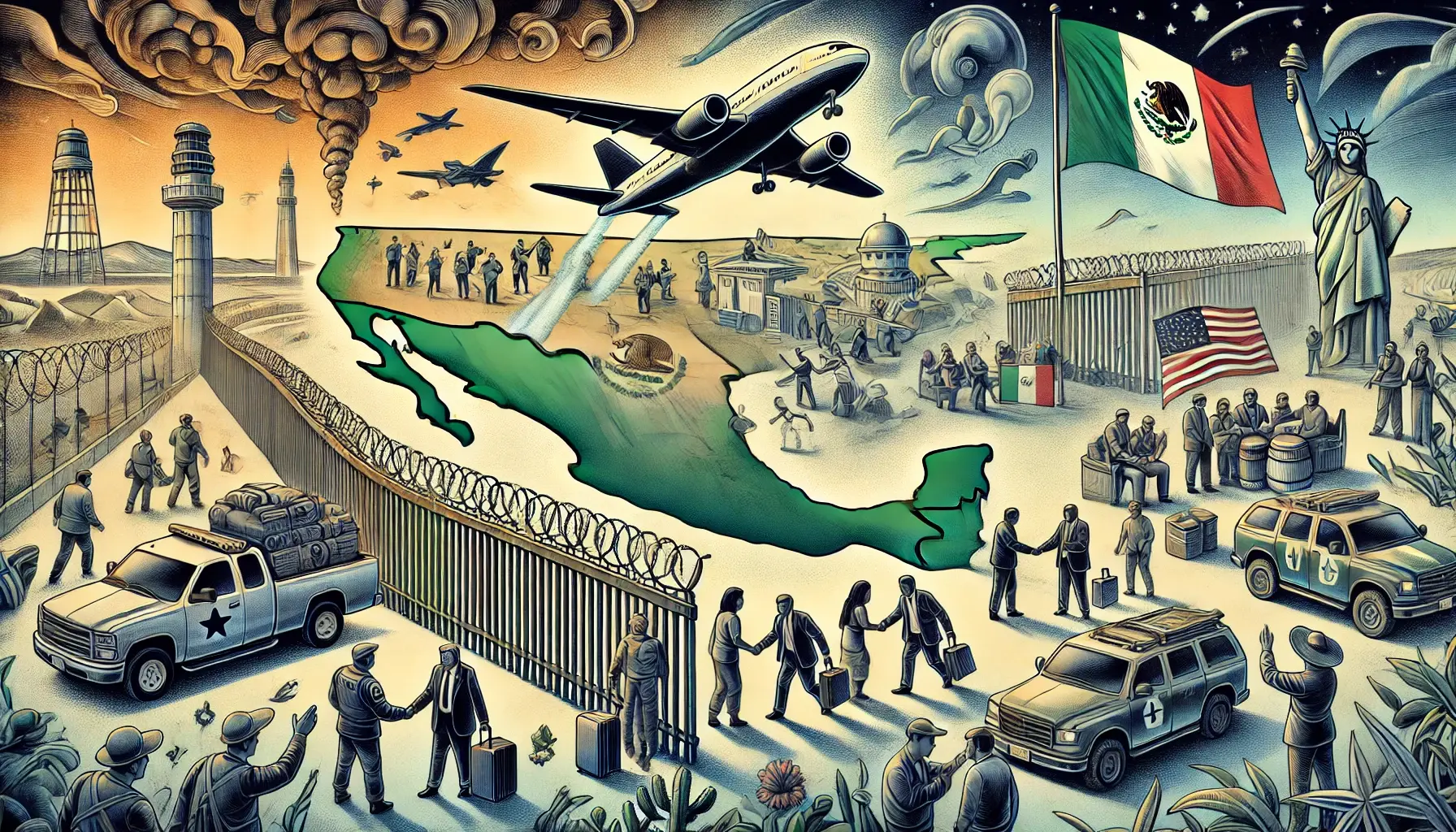Why Mexico Refuses Deportation Flights: An In-Depth Analysis
To understand why Mexico refuses deportation flights, we must dive into the complexities of international relations, domestic policies, human rights concerns, and geopolitical dynamics.
In recent years, immigration policies and international cooperation between nations have increasingly come under scrutiny. One of the significant debates revolves around Mexico’s stance on deportation flights, specifically its refusal to accept certain flights carrying deported individuals.
Mexico Refuses Deportation Flight: Understanding Deportation Flights
Deportation flights are a mechanism used by governments to return individuals, often undocumented immigrants, to their country of origin. These flights usually involve cooperation between the deporting and receiving nations, requiring detailed agreements to ensure that the deportation process adheres to international laws and standards.
The United States, for example, conducts thousands of deportation flights annually as part of its immigration enforcement. These flights primarily target individuals who have entered the country illegally, overstayed their visas, or committed criminal offenses. However, the process is not always seamless, particularly when the receiving country, in this case, Mexico, refuses to accept certain flights.
Mexico’s Historical Role in Migration
To comprehend Mexico’s position, it’s crucial to consider its historical and geographical role in migration. Mexico serves as a transit country for millions of migrants, particularly those from Central America, seeking to reach the United States. Additionally, Mexico is a country of origin for many migrants who pursue economic opportunities or escape violence and poverty by crossing into the U.S.
Mexico’s dual role as a transit and origin country places it in a unique position, often making it the focal point of U.S. immigration policies. The country has historically cooperated with the U.S. on migration issues, but it also faces internal challenges and external pressures that complicate its ability to accept deportation flights.
Key Reasons Why Mexico Refuses Deportation Flights
1. Overburdened Immigration System
Mexico’s immigration system is under significant strain. The country’s resources are stretched thin as it manages the influx of migrants from Central America, Haiti, and other regions. Shelters and detention centers are often overcrowded, and officials are overwhelmed by the sheer number of migrants requiring processing.
Accepting deportation flights adds to this burden, creating logistical challenges. Many deported individuals need temporary housing, medical care, and reintegration support, which Mexico struggles to provide given its limited resources.
2. Human Rights Concerns
Mexico has voiced concerns about the treatment of deported individuals, particularly in cases where due process was not followed during deportation proceedings. Allegations of mistreatment, lack of access to legal representation, and deportations of vulnerable populations (such as unaccompanied minors or asylum seekers) have raised red flags for Mexican authorities.
Additionally, international human rights organizations have criticized the U.S. for deporting individuals to unsafe conditions. Mexico’s refusal to accept certain flights is, in part, a stance against potential violations of human rights and international laws.
3. Diplomatic and Political Tensions
The relationship between Mexico and the United States is complex, shaped by decades of cooperation, conflict, and negotiation. While the two nations work together on many issues, including trade and security, immigration often becomes a contentious topic.
Mexico’s refusal to accept deportation flights can be viewed as a political statement. By pushing back against U.S. immigration enforcement policies, Mexico asserts its sovereignty and calls attention to what it perceives as unfair or inhumane practices.
4. Public Opinion and Domestic Politics
Public opinion within Mexico plays a significant role in shaping government policies. Many Mexicans view deportation flights as a form of humiliation or mistreatment of their compatriots. Accepting these flights can be politically unpopular, particularly for leaders who seek to project a strong and independent image.
Furthermore, Mexico’s government must balance the demands of its population with the expectations of its international partners. Refusing deportation flights can be a way to demonstrate solidarity with deported individuals and appease domestic audiences.
5. Economic Implications
Deportation has economic consequences, both for the individuals involved and for their countries of origin. Many deported individuals are breadwinners whose remittances support families back home. Their sudden return can create financial hardship for those families and strain local economies.
For Mexico, accepting large numbers of deported individuals can exacerbate unemployment and poverty, particularly in regions already struggling with economic challenges. Refusing deportation flights helps mitigate these economic pressures.
Mexico Refuses Deportation Flight: The Role of International Law and Agreements
International law plays a crucial role in shaping deportation policies. Nations are obligated to respect the rights of migrants and ensure that deportation procedures adhere to established standards. However, the implementation of these laws often varies, leading to disagreements between countries.
Mexico’s refusal to accept certain deportation flights highlights the gaps in international agreements and the need for comprehensive solutions. Bilateral agreements between Mexico and the U.S. have attempted to address these issues, but they often fall short of resolving the underlying tensions.
Mexico Refuses Deportation Flight: Human Stories Behind the Numbers
Mexico Refuses Deportation Flight: Behind every deportation flight is a human story, families torn apart, dreams shattered, and lives upended. These personal narratives underscore the need for humane and compassionate immigration policies.
For instance, consider the case of Maria, a single mother deported from the U.S. after living there for over a decade. Maria’s children, U.S. citizens by birth, were forced to choose between staying in the country of their birth or accompanying their mother to a land they barely knew. Stories like Maria’s highlight the emotional and psychological toll of deportation, not just on individuals but on entire families.
Mexico Refuses Deportation Flight: Potential Solutions and the Path Forward
Addressing the issue of deportation flights requires a multi-faceted approach. Here are some potential solutions for why Mexico Refuses Deportation Flight:
1. Strengthening Regional Cooperation
Countries in the Americas must work together to address the root causes of migration, such as poverty, violence, and climate change. Regional cooperation can help create sustainable solutions and reduce the pressure on transit and destination countries.
2. Reforming Immigration Policies
Both Mexico and the U.S. must reform their immigration policies to prioritize human rights and fairness. This includes providing legal pathways for migration, ensuring due process during deportation proceedings, and offering support for reintegration.
3. Investing in Economic Development
Investing in economic development in countries of origin can help reduce migration by creating opportunities at home. International aid and development programs should focus on education, job creation, and infrastructure development.
4. Enhancing Support for Deportees
Mexico can improve its capacity to support deported individuals by expanding shelters, providing access to healthcare and counseling, and offering job training programs. International organizations and NGOs can play a vital role in these efforts.
5. Promoting Dialogue and Understanding
Finally, promoting dialogue and understanding between nations, as well as between governments and their citizens, is essential. Open communication can help build trust and foster cooperation on migration issues.
Conclusion: Mexico Refuses Deportation Flight
Mexico’s refusal to accept deportation flights is a complex issue rooted in a mix of logistical, political, and humanitarian concerns. While the decision may strain relations with the U.S., it also highlights the need for a more humane and comprehensive approach to immigration.
By addressing the root causes of migration, reforming policies, and fostering international cooperation, nations can work towards solutions that respect human dignity and promote shared prosperity. The journey is challenging, but it is one worth undertaking for the sake of millions of migrants seeking a better future.
For More Information, Check out NetworkForbe


